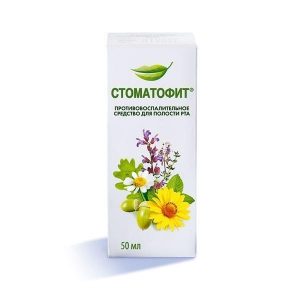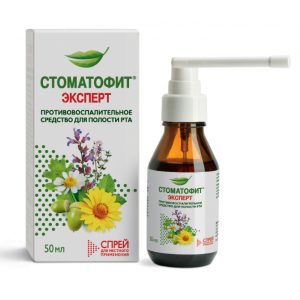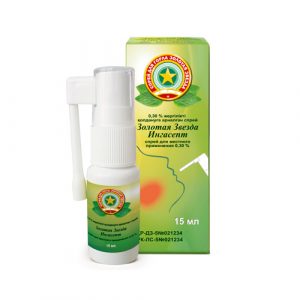Description
Pharmacological action
Pharmacodynamics: Benzidamine is a non-steroidal anti-inflammatory drug that belongs to the group of indazoles. It has an anti-inflammatory and local anesthetic effect, has an antiseptic effect against a wide range of microorganisms. The mechanism of action of the drug is associated with stabilization of cell membranes and inhibition of prostaglandin synthesis. Benzidamine has an antibacterial and specific antimicrobial effect due to the rapid penetration of microorganisms through the membranes, followed by damage to cellular structures, impaired metabolic processes and cell lysosomes. It has an antifungal effect against Candida albicans. It causes structural modifications of the cell wall of fungi and their metabolic chains, thus inhibiting their reproduction, which was the basis for the use of benzidamine in inflammatory processes in the oral cavity, including infectious etiology. Pharmacokinetics: When applied topically, the drug is well absorbed through the mucous membranes and penetrates into inflamed tissues, is found in the blood plasma in an amount insufficient to produce systemic effects. The excretion of the drug occurs mainly by the kidneys, in the form of inactive metabolites or conjugation products.
Indications
Symptomatic pain therapy for inflammatory diseases of the oral cavity and ENT organs (of various etiologies): – gingivitis, glossitis, stomatitis (incl. after radiation and chemotherapy) – pharyngitis, laryngitis, tonsillitis – candidiasis of the oral mucosa (as part of combination therapy) – calculous inflammation of the salivary glands – after surgery and injuries (tonsillectomy, jaw fractures) – after treatment and tooth extraction – periodontal disease Infectious and inflammatory diseases requiring systemic treatment – as part of combination therapy.
Contraindications
Hypersensitivity to benzydamine or other components of the ENT sprocket, children under 3 years old (for topical spray 0.15%) or children under 18 years old (for topical spray 0.30%).
Special instructions
Hypersensitivity reactions may occur with the use of the drug. In this case, it is recommended to discontinue treatment and consult a doctor to prescribe appropriate therapy. An ulcerative lesion of the mucous membrane of the oropharynx may indicate the presence of a more serious pathology. If symptoms persist for more than 3 days, consult a doctor. The use of the drug is not recommended in patients with hypersensitivity to acetylsalicylic acid or other non-steroidal anti-inflammatory drugs. The drug should be used with caution in patients with a history of asthma due to the possibility of developing bronchospasm in patients with the use of the drug. The drug Asterisk ENT contains a low level of ethanol. Containing ethanol less than 100 mg in a single dose.
Composition
Active component: benzidamine hydrochloride – 45 mg Auxiliary components: glycerol – 3.0 g, ethanol – 6.0 g, sodium saccharin – 30 mg, peppermint flavor – 30 mg, water – up to 30 ml.
Dosage and administration
The drug should be applied topically, after meals. One injection, with a short-term (1-2 sec.) Pressing the sprayer, corresponds to 0.255 mg of benzidamine for a dosage of 0.15% or 0.51 mg of benzidamine for a dosage of 0.3%. Topical Spray 0.15%: Adults (including elderly patients) and children over 12 years of age with 4-8 injections 2-6 times a day. Children from 6 to 12 years old – 4 injections 2-6 times a day. For children from 3 to 6 years, 1 injection for every 4 kg of body weight, but not more than 4 injections (maximum single dose) 2-6 times a day.
Side effects
Classification of the incidence of side effects of the World Health Organization (WHO): very often – 1/10 often – from 1/100 to <1/10 infrequently - from 1/1000 to <1/100 rarely - from 1/10000 to <1/1000 is very rare - <1/10000 frequency is unknown - cannot be estimated based on available data. Local reactions: rarely - dryness, burning sensation in the oral cavity frequency is unknown - a feeling of numbness in the oral cavity. Allergic reactions: infrequently - photosensitivity rarely - hypersensitivity reactions, skin rash, skin itching very rarely - angioedema, laryngospasm frequency unknown - anaphylactic reactions. If any of the side effects specified in the instructions are aggravated, or other side effects are noted that are not listed in the instructions, you should immediately inform your doctor. Overdose of No cases of benzidamine overdose have been reported. When using the drug in accordance with the instructions for use, an overdose is unlikely. If the drug is accidentally swallowed, the following symptoms are possible: vomiting, abdominal cramps, anxiety, fear, hallucinations, cramps, ataxia, fever, tachycardia, respiratory depression. The antidote is unknown. In case of an overdose, gastric lavage is recommended, symptomatic treatment. Storage conditions In the dark place at a temperature of no higher than 30 ° C. Store in places inaccessible to children. Expiration 3 years Deystvuyuschee substances benzydamine Terms and conditions without prescription dosage form drug d14freflpfd646490 d14 dfreflpf90641490 d14 drug




